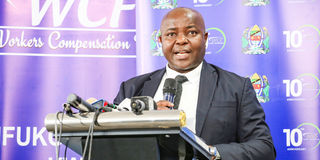WCF value soars 68 percent in four years, reaching Sh748 billion

WCF director general, Dr John Mduma, adresses a media briefing in Dar es Salaam on May 15, 2025, highlighting the Fund's achievements over four years of President Samia Suluhu Hassan's administration, coinciding with WCF's 10th anniversary. PHOTO | CORRESPONDENT
What you need to know:
- The fund is projected to reach Sh766.6 billion by the end of the 2024/25 financial year. Over the period, WCF has provided compensation to 19,650 employees and their dependants for work-related injuries, illnesses, or fatalities.
Dar es Salaam. The Workers Compensation Fund (WCF) has recorded a 68 percent increase in value over a four-year period, growing from Sh445 billion in the 2020/21 financial year to Sh748 billion currently.
The fund is projected to reach Sh766.6 billion by the end of the 2024/25 financial year. Over the period, WCF has provided compensation to 19,650 employees and their dependants for work-related injuries, illnesses, or fatalities.
Speaking during a press briefing with editors and journalists yesterday, WCF director general, Dr John Mduma, said the fund’s growth reflects its sustainability and operational strength.
“The growth in the fund’s value signals the sustainability and strength of our services in fulfilling our mandate,” he said.
Dr Mduma added that the International Labour Organization (ILO) has acknowledged WCF’s financial resilience, stating that the fund is stable enough to remain operational for at least the next 30 years, even in the event of legal or contribution policy changes.
Highlighting employer registration, he noted that WCF has successfully registered 96 percent of employers nationwide.
“This achievement is largely due to our integration of digital systems. More than 96 percent of our services are now accessible online, significantly improving efficiency and productivity in service delivery,” Dr Mduma said.
These digital systems have enabled WCF to identify employers in both the public and private sectors, and to maintain a high level of coverage.
Dr Mduma explained that the fund’s systems are linked to national databases and healthcare providers, allowing seamless data exchange with key stakeholders. He also spoke of growing international interest in Tanzania’s compensation fund management systems.
“Countries such as Kenya, Zambia, Malawi, and Ethiopia have already shown interest in learning from our experience, particularly in areas like digital integration, data management, and service efficiency. Namibia is expected to join them soon,” he said.
In turn, WCF has also gained new insights through benchmarking. A recent visit to South Africa enabled the fund to explore the application of Artificial Intelligence (AI) in compensation processing.
“We learned how AI can improve the speed of benefit processing. We saw the potential and are now working towards integrating AI as part of our ongoing digital transformation,” he said.
Interestingly, Dr Mduma noted that WCF is already excelling in areas where South Africa is still developing—such as identifying employees in the system proactively, rather than only after incidents occur. On the issue of compensating spouses of deceased workers, WCF director of operations, Mr Anselm Peter, said the fund sometimes relies on local testimony to verify relationships.
“If neighbours confirm that the couple lived together as husband and wife for over two years, we ensure that the rightful claimant receives the compensation,” he said.





